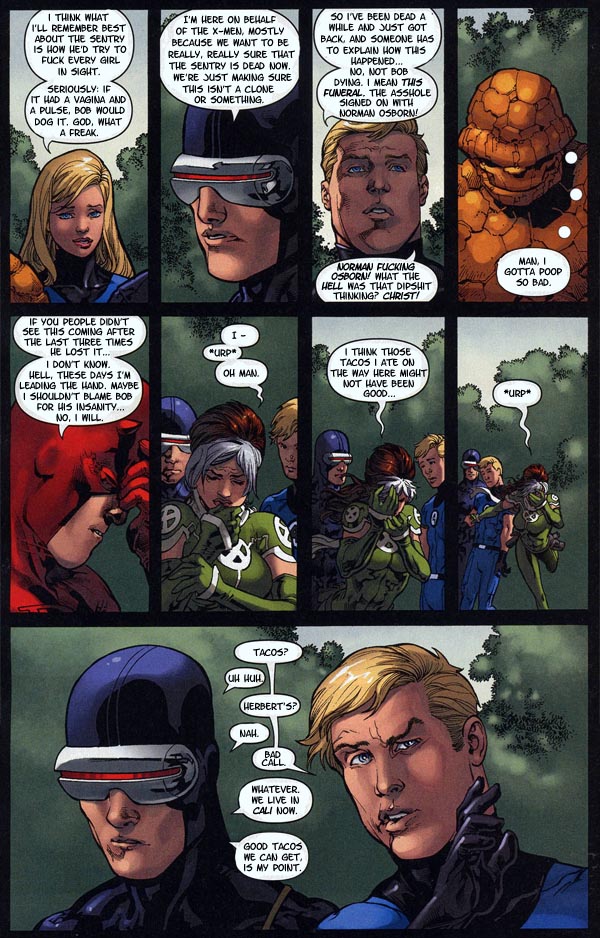
24
May
So basically if everybody begs enough sometimes it works
Posted by MGK Published in Bad Comedy, Comic Remixes, Comics, Photoshopp'd
21
May
Overcompensating: Why Everyone Hates the Sentry
Posted by John Seavey Published in Comics, General Nerd ShitLast week, in my post on character death, I mentioned that the one character who absolutely nobody will miss is the Sentry, Marvel’s attempt to see just how narrowly the courts interpret the laws against copyright infringement (and just how badly they can piss off Alan Moore. I sometimes suspect that the Big Two have some sort of secret engine hidden in their basement, fueled entirely by Alan Moore’s irritation with them, and they need to periodically stoke it by leaving copyright notice off of his work or making a shitty movie version of one of his comics.) But I didn’t get to the root of the problem. Why, apart from being a gigantic fucking Mary Sue and a blatant rip-off of Miracleman and apocalyptically uninteresting, is the Sentry such a goddamn terrible character that death wasn’t good enough for him?
Unfortunately for my attempts to be original and clever, Ragnell posted a very nice analysis on her blog that notes a lot of the key points. I’ll try not to repeat too much of what she said, because that’s what links are for, but basically she points out how the Sentry is portrayed as retroactively being the most awesome person in the whole Marvel Universe, the guy who was everyone’s best friend and mentor and helped Angel learn how to embrace his mutant gift and showed Reed Richards how to care and taught Rogue how to love and shot Uncle Ben…no, wait. Not that last one.
But she doesn’t get deep enough into the problem. She points to those things as being terrible in and of themselves, because they reduce the entire Marvel Universe to the role of supporting characters in the Sentry’s story, and she’s right, but the deeper problem is that those things didn’t happen. The Sentry is not a long-established, integral part of the Marvel Universe. He’s not the one guy who’s always been able to calm the Hulk down when he’s pissed, he’s not the one guy who Doctor Doom has always been afraid of, he’s not the one guy who Reed Richards can talk to and the one guy that Rogue can turn to for a booty call. He’s some total schmuck we don’t care about. We are not emotionally invested in the Sentry, because that’s something you have to earn over time. It cannot be imposed by editorial fiat.
Not that they haven’t tried. There’s almost an element of condescension to the constant retcons that shove the Sentry into an ever-higher profile within the fictional history of the Marvel Universe. “Oh, the Sentry is totally a major part of the Marvel Universe and always has been! You just don’t remember him. Stupid, stupid readers. Why don’t you remember how awesome the Sentry was?” But it doesn’t work because we’ve got the back issues. We’ve read the stories. They were an integral part of our childhood, and our transition to adulthood. And the Sentry wasn’t there. Having him show back up now is like having your absentee dad pop back up when you’re thirty and try to take you to a ballgame.
(Actually, it’s a bit like Indiana Jones and the Kingdom of the Crystal Skull. Having an old friend of Indy’s betray him at a crucial moment, shattering their long-time friendship and setting them against each other? Good idea. Having the friend be someone we’ve never met and have no emotional investment in? Not so much. It’s hard to care about Mac’s betrayal, because he’s a total stranger to the viewer. The whole thing feels hollow.)
No matter how much history they make up for the Sentry in the Marvel Universe’s timeline, it’s history with the reader that counts. All the retcons have a faint stench of desperation to them, a feeling that they can compensate for lack of depth with an increase in volume. There’s no history between the Hulk and the Sentry? Howabout we just have everyone talk about how they’re the bestest friends ever! The Sentry’s never really achieved any kind of heroic triumphs? Howabout we have everyone remind each other about how he saved the world over and over and over again! The more they talk about how great he is, the more it reminds us that we haven’t seen any actual evidence of that supposed greatness, and the more hollow and useless he seems. Until at the end, we get a funeral scene filled with characters telling us how much he changed their lives forever with his brilliance and awesomeness…only to never ever ever mention him again the second the dirt is heaped on his grave.
19
May
Some stupid human has gone and injured themselves on a mountain! Whatever will they do? Perhaps they need the aid of a St. Bernard!
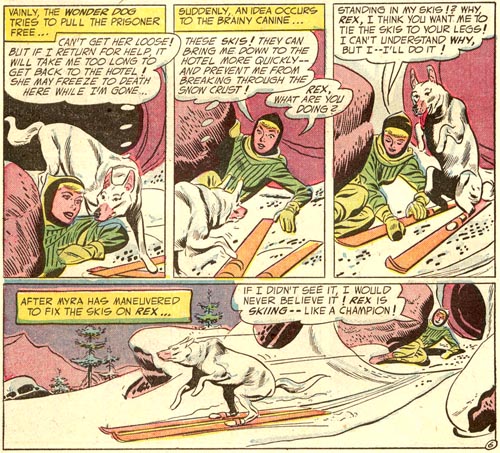
No, of course they don’t need no crap-ass St. Bernard. St. Bernards are for suckers. If you’re smart, you get the help of Rex the motherfucking Wonder Dog.
BONUS: Rex demonstrates his mad aerial skills.
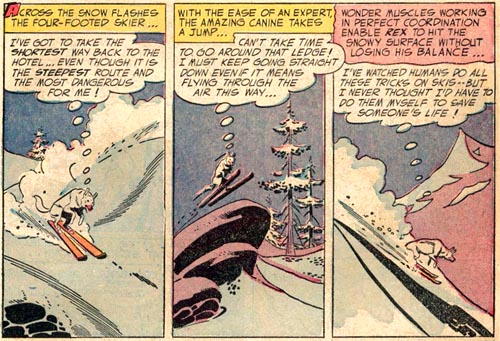
17
May
The obligatory death-of-comics post
Posted by Matthew Johnson Published in Comics, General Nerd Crap, When I Was A KidI had an interesting experience this weekend at a yard sale on my street. While digging through a bin full of kids’ clothes in hopes of finding some for my two-year-old son, I had a Spider-Man t-shirt thrust into my hands. “Trust me,” said the father of the boy whose old toys and clothes were being sold, “when he turns three he’ll be demanding that you get him one.”
It’s true; my neighbourhood is full of kids, and nearly all of the boys routinely wear clothing with logos or images of superheroes; Spider-Man is easily the most popular, but I often see Superman, Batman and occasionally Wolverine. Love of superheroes seems to be an almost universal phenomenon among boys of a particular age. At the same time, it’s almost certain that few of those boys will wind up being regular or even occasional comics readers. This presents us with a paradox: superheroes are more prominent in popular culture than ever (particularly kids’ culture), but fewer and fewer people are reading comics – and almost none of them are kids.
I don’t need to tell you what you’ll see if you go into a typical comics shop: adults, and not even particularly young ones. Sure, you’ll see a few teens, but odds are they’re there for whatever anime and manga the shop sells – and you certainly won’t see anyone under thirteen. This isn’t a new problem, and lots of people have discussed the reasons for it and possible strategies for addressing it. But I’d like to raise two points that I’ve never heard mentioned. First, that the loss of the children’s market is due to a fundamental misunderstanding of what kids’ comics are for; second, that the paradox I describe above is not actually a paradox, in that the omnipresence of superheroes in media and merchandising is actually a cause of the loss of the children’s market.
Let’s start with the purpose of comics. Not the purpose of comics for you and me, or the purpose of comics for the kid who might theoretically read them, but the purpose they serve for the parents who might conceivably buy a comic for their child. For parents, comics are not an entertainment medium; they are a distraction device. Think back to your earliest childhood experiences with comics. Here are mine: being bought comics to keep me quiet at restaurants while we waited for the food; being bought comics to keep me quiet in the car while we drove to the cottage; being given comics in my Christmas stocking to keep me quiet while my parents slept a few more hours… getting the picture? So long as the content isn’t explicitly offensive (are you reading this, dismemberment fans?) parents don’t care what’s in a comic so long as it distracts Junior for a reasonable amount of time. Once you look at it that way, you see why comics for kids don’t work today. You need to go to a special store to buy them, and the price-to-value ratio is terrible – especially when you compare them to an in-car DVD player or an iPhone. (There’s a reason the NFB’s free library is one of the top iPhone apps.)
That covers the parent side of the equation, but what about the kids? Children can whine hard enough to overcome nearly any parental reluctance to buy something, so if they’re so keen on superheroes why aren’t they demanding comics? Because they don’t particularly want to read Spider-Man comics; they want to be able to project themselves onto Spider-Man as a fantasy figure, and they don’t care whether they get that fix from movies, TV, the Web, their t-shirts or Underoos. This is where it gets counter-intuitive: rather than leading kids to comics, the merchandising is satisfying a need that once only comics could meet (of course, it doesn’t help that in many cases the media versions are better than the comics ones.)
So what can comics publishers do to get kids reading comics again? Well, they’re not going to do it by publishing kid-friendly comics in the traditional format; as good as those individual comics may sometimes be, they don’t meet parents’ value-for-cost analysis, and they don’t meet kids’ need for superhero fantasy any better than do other sources they can access more easily. What they need to do instead is make printed comics that are bigger and cheaper (imagine a scaled-down version of Marvel’s Essentials line) and sell them everywhere: gas stations, convenience store, grocery stores – you know, everywhere you used to buy comics. Or they can give up physical comics and concentrate on the Web – or, what’s really the most rational option, give up on comics entirely and simply license the characters.
15
May
Some Insane People Are Not Named Betty Cooper
Posted by Jaime Weinman Published in Archie (Improved Or Otherwise), Comics, WTFThe one thing Archie Andrews can be thankful for is that Betty Cooper doesn’t (usually) have god-like magical powers that allow her to kill or maim other people on a whim. Harvey… er… No-Last-Name is not so lucky. As revealed in this story from Sabrina # 21 (September 1974), written by Frank Doyle and drawn by Stan Goldberg before his characters’ faces started melting, Sabrina has adopted a policy of talking nice to her boyfriend while quietly using her Satanic powers to wreak destruction on any girl who even looks his way.
The violence begins in the splash panel, as Sabrina congratulates herself on her own lack of jealousy while literally raining thunder and lightning down on this poor girl whose only crime was to be (inexplicably) interested in Harvey. The whole thing has a “why don’t you stop drenching and electrocuting yourself” feel too it.
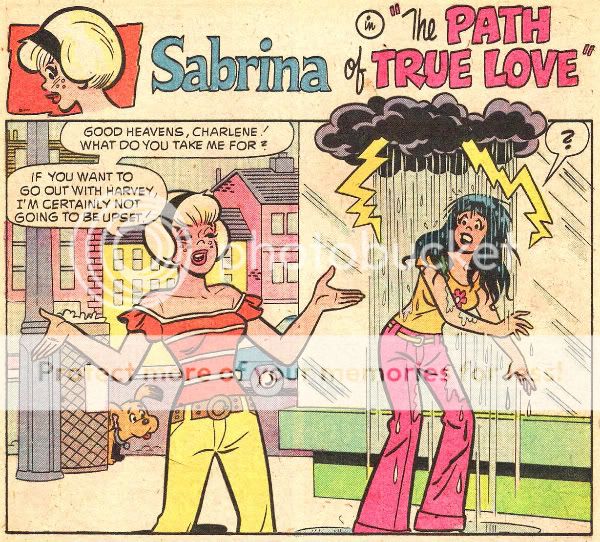
Then, after the girl has made it clear that she’s been thoroughly scared away, Sabrina tries to murder her by making a heavy sign fall on top of her. Just for the hell (again, literally) of it. Also, “Eeyipe!” was clearly a favourite Frank Doyle word along with “EEP!” “Urk!” and “W-ell.”

The freckled hell-spawn then returns to telling her poor sap of a boyfriend how wonderful he is, but senses danger when a stranger winks at him. So of course she does what anyone would do in a situation like that: causes her to have an entire supply of garbage poured onto her. I guess she was allowed to escape without any permanent scars only because she didn’t actually talk to him.


And, as the story ends, we see Sabrina casually destroying the lives, bodies and futures of literally every other young woman in sight, because it’s better to turn them into reptiles amphibians or cast them down to the centre of the Earth rather than risk having them talk to a guy who would later be played by Nate Richert. (Whatever happened to Nate Richert anyway?) I think my favourite image is of the girl being pulled into a mysterious building with a “girls wanted” sign. Apparently Sabrina is also using her witchcraft to sell women into prostitution.

I just wonder what Betty Cooper would do if she had supernatural powers. How could she ever top Sabrina’s combination of cruelty, viciousness and pathology?
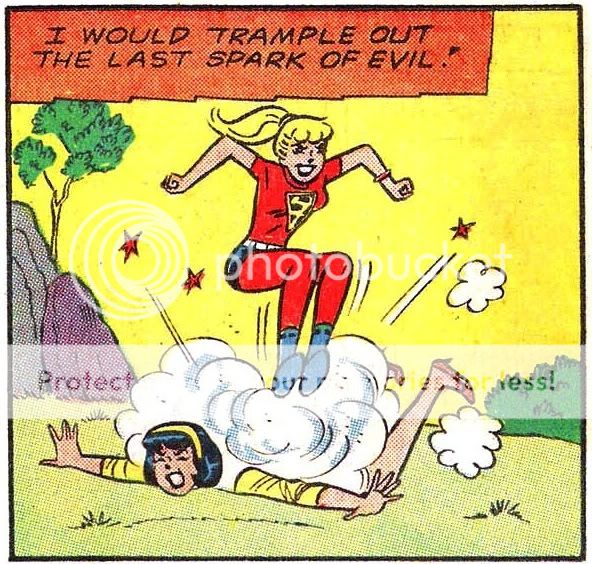
I’m sorry I asked.
14
May
Preventing Gratuitous Resurrections: A Fool-Proof Plan
Posted by John Seavey Published in Comics, General Nerd Crap, WriteringEverybody hates gratuitous resurrections, right? It’s just a fanboy thing, like bagging your comics or bickering about who would win in a Batman/Captain America fight. It just sucks that they (Marvel or DC, take your choice) continue to insult our intelligence by giving us unbelievably contrived resurrection storylines. “It wasn’t me who died! A cosmic alien impersonated me while I was in suspended animation, then blew herself up and telepathically inserted a shard of her consciousness into my clone, who then got absorbed into my mind when she died!” “No, I never died at all! Being impaled through the chest with an eight-inch-thick chunk of razor-sharp metal merely greatly inconvenienced me!” “Yeah, when I got decapitated by Wolverine? Funny story…”
Comics writers are well aware of this particular fanboy pet peeve; how could they not be? You only need to be accosted so many times at a convention by an angry fan saying, “You should never have brought back Barry Allen/Harry Osborn/Doctor Octopus because their death was so meaningful!” So they try everything they can to make sure that this time, when they kill off a character, they ain’t coming back.
They’ve long ago realized that you can’t just kill someone off in an explosion or a fall; dying off-panel is an automatic “Get Out of Kill Free” card. And they’ve figured out that exotic deaths never work, either; if Wonder Man dies of ionic energy poisoning, you can bet that somewhere down the line, somebody’s going to get the bright idea to bring him back. And who’s to say that ionic energy poisoning doesn’t just cause you to go into suspended animation, anyway?
So it’s got to be on-panel. It’s got to be a “real” cause of death. And the latest innovation: It’s gotta be gory. Sure, you might survive a gunshot wound, but are you really going to survive having your head popped like a zit by Black Adam, or ripped in half…um…also by Black Adam…or impaled on a sword? (By Deathstroke; presumably, Black Adam was busy that day.) Um…actually, the answer seems to still be “yes”. The Martian Manhunter came back after being immolated on-panel, Ronnie Raymond returned from a full-on chest stabbing, Colossus wasn’t stopped by cremation, and even perma-death poster boy Bucky showed up again as Grim-N-Gritty-Cyborg-Assassin-Bucky.
Clearly, the only solution is an editorial mandate. From now on, it’s time to take a hard line: No more gratuitous resurrections. That’s right, no matter how popular the character, no matter how unpopular the death sequence, Psylocke is not coming back from the dead! Editor-in-Chief Joe Quesada has sp…oh. Hmm. Maybe that’s not as fool-proof as we thought.
The truth is, there actually is a fool-proof way of stopping gratuitous resurrections in comics. It’s even simple, easily executable, and would be wildly popular with fans. Ready for it? Here it is:
STOP KILLING THEM IN THE FIRST PLACE.
Seriously, is this really that hard to understand? There’s no way you can possibly make a death stick in a comic book; they’re fictional characters, they’ll come back as long as someone remembers them fondly enough to bring them back. And as Bucky proves, that can be an amazingly long time. Since there’s no way to make death anything more than a temporary condition in a comic-book universe, why keep deploying it? Surely it can’t be for shock value. Jaded fans no longer care about comic-book death, not when DC kills the Martian Manhunter and resurrects Barry Allen in the same crossover. Death in comics doesn’t matter anymore as much because it’s overused as because it’s impermanent. So why not just let death die for a while?
Except for the Sentry. The only possible reason to bring him back is that he’s NOT FUCKING DEAD ENOUGH.
13
May
Sun machine is coming down, we’re gonna have a party
Posted by MGK Published in Comics, I Should Write Dr. Strange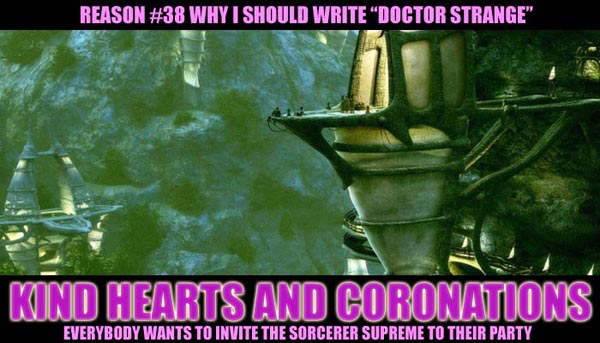
The Sorcerer Supreme is of course tasked with the defense of this reality from all others. But the thing about defense, as any diplomat can tell you, is that there’s multiple ways to do it. A massive display of might is always a good option A, but there will always be those too cocky, too stupid, or too powerful to be dissuaded by your ability to turn armies into a pile of barely-sentient suet named Wuggles.
Option B is diplomacy, and as in our level of understanding, it is often very convenient and simple: being on polite terms with powerful sorcerers of other dimensions is, by and large, quite worthwhile. Firstly, it means that you can worry much, much less about them being hostile to Earth’s reality, which in and of itself is pretty awesome. Secondly, it means that every so often you can deal with them for help, which comes in handy – well, not that often, really, because rulers of other dimensions tend to inflate the value of their services more than you would think and usually it’s just a better deal to go with the really powerful grantors of power, but sometimes it can be downright useful, and better to have the option than not.
However, the opportunity cost of the diplomatic approach is often… irritating. For example, the Sorcerer Supreme is, like it or not, considered a “get” for organizers of social events in other dimensions. (Even when the other dimension’s powerful person offering the invite outclasses Doc. It’s like having a party and, say, the President of Hungary shows up – you look good even if your country makes Hungary look like a 98 pound weakling.) And you can’t turn down all the invitations. You can turn down the smaller ones, of course, and they won’t feel bad – even if you just send a polite note (or polite etched memory crystal, or polite scent-of-regret-on-jasmine-airbursts), simply that will make your prospective host feel better.
But some of them are too important to turn down. So when the Malagascor of Fijw requests your presence at the liferment ceremony of his firstling, you pretty much have to go – because, sure, Dr. Strange can probably take down the Malagascor of Fijw in a straight-up spell-sling, but why would you want to have a fight to the death when you can just go to a party instead?
But of course it’s never that simple. Because
– the Undying King of Pallia and the High Ku Of Ku both find Stephen and demand he intercede on their respective behalves in the interdimensional war they’re currently fighting, both convinced that he’s promised to do so
– the party from Asgard insist that Dr. Strange, as an honorable champion of Earth, have them as his personal retinue, which is problematic considering they’re mostly half-drunk berserkers (except for that one valkyrie who looks oddly familiar…)
– Regena, daughter of Gjo, wants to discuss arrangements for an upcoming wedding that Stephen is quite certain he didn’t agree to (but she is quite certain he proposed, and in most gentlemanly extravagance!)
– he has to make sure that he and Umar are never in the same room – not because he fears her (although of course he does because he’s not an idiot), but because he’s put quite a bit of work into making sure that the Dark Dimension’s intelligence network thinks he’s still on Earth (and who the hell invited Umar to this thing anyway?)
– a Kronn chronolord demands retribution for the horrible insult Strange will cause him in twenty-five minutes’ time, although the exact nature of that insult is a mystery to all concerned
– and of course, the Malagascor had ulterior motive for inviting Stephen in the first place…
12
May
Not Quite Improved Archie
Posted by MGK Published in Archie (Improved Or Otherwise), Comics, Interactive Fun Time Party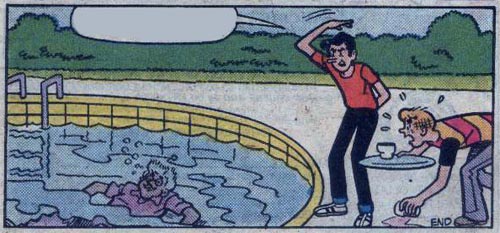
8
May
Occasionally clunky-to-the-point-of-groaners script and Scarlett Johanssen’s “acting” (as opposed to her stunt double, the wonderfully named “Heidi Moneymaker,” who is amazing) fail to ruin an overall enjoyable comic-book movie experience.
6
May
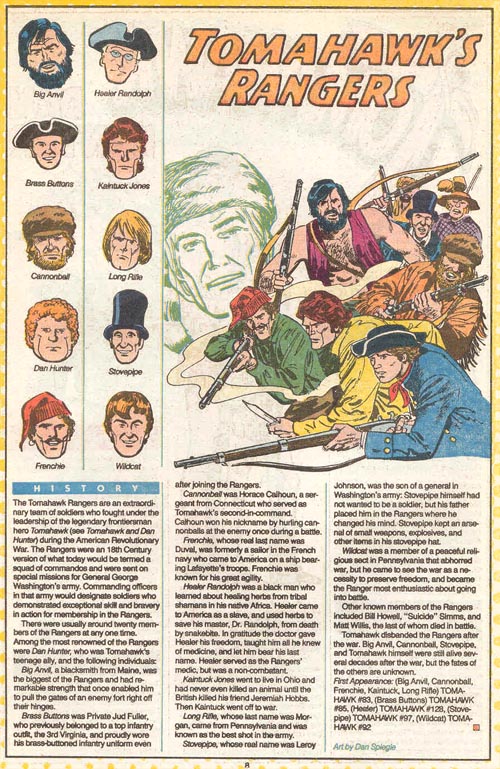
Meet Tomahawk’s Rangers!
Dan Hunter: Tomahawk’s sidekick and former man-boy life partner (seriously, one day I’ll post the Tomahawk and Dan Hunter entry from Who’s Who and you will al go eeeewwwwwwww) found himself dumped after he got old and chunky (look at the jowls on him, no wonder Tomahawk lost interest), so he found himself leading an elite unit of… guys!
Big Anvil: He’s strong! He once lifted a gate off its hinges! He’s got a beard! He wears a purple vest! Did we mention he’s strong? Because he’s strong!
Brass Buttons: This is a guy who came from a uniformed regiment and was so proud of the fact that he refused to take off his uniform even when he was in a band of guerrilla warriors. You can’t really ask questions about a guy who was in a top infantry regiment and then somehow got transferred to Tomahawk’s Band Of Unwashed Crazies; it wouldn’t be polite. Besides, the way he shined those buttons all the time was kind of creepy. Did anybody actually see this guy come from the regiment? Or did he just show up one day? Man, somebody ought to check that uniform for bloodstains or knife-stabbin’ holes.
Cannonball: Not the X-Man, but a guy who threw cannonballs at the enemy. Presumably there was no cannon working at the time. Or maybe there was. I mean, you can just see this guy throwing cannonballs, and there’s this other guy standing right next to him with the thingy that stuffs the cannon that looks like a giant Q-tip saying, “Uh, Horace, we’re just supposed to put the cannonballs in the cannon. That’s what they taught us in cannon school. I mean, look, the enemy’s still over two hundred feet away. Maybe we should fire the cannonballs with the cannon.” But Horace is all YARRRRRRRRGH TAKE THAT YOU BRITISH FUCKS and shortly thereafter he finds himself in Tomahawk’s Rangers.
Frenchie: A Frenchman! Who dresses like a Quebecois lumberjack! That makes him twice as French as anybody else on the planet! He grew up in a tiny French town and decided that it was just not French enough! Also, he is known for being agile – because he trained as a mime before learning to use his mimery to kill in the most singularly French way possible!
Healer Randolph: The amazing black man who is not actually black! Seriously, look at that dude. It must have been confusing when he was on the plantation. He’d be all “Can I help you, Master Johnstone?” And the visiting plantation owner from upstate would be all “WhaaaaAAAAAAA?” And then there would be a sitcom moment as everybody laughed and waited for his catchphrase, “No, actually I’m a slave, sir.” (Also, note that Healer Randolph was the only non-combatant in the Rangers. Typical that they didn’t want the black man having a gun. Didn’t they see The Patriot?)
Kaintuck Jones: Lived in northern Ohio all his life and still insisted on being called “Kaintuck.” His other nickname was “Dumbass Jones.”
Long Rifle: Actually just an excuse for the writers to come up with a strings of penis jokes.
Stovepipe: Kept explosives in his stovepipe hat. No, really. He did this. He decided that the best place to carry explosives was right on top of his head. And here’s the thing: Stovepipe survived the war! Lots of other Rangers all bought it (although, apparently, not “Suicide” Simms, who was particularly ill-named unless it was one of those things where you call the big fat guy “Tiny” or “Slim” because that’s funny) but Stovepipe, who spent just about every moment of every day courting death in the stupidest way possible, made it through unscathed. Fate is indeed a fickle bitch.
Wildcat: Was a Quaker and a pacifist until he went to war and found out that shooting people to death and stabbing them with bayonets and knives and occasionally spears or just, like, hitting them until they stop moving, and then staring at the red, red blood all over your hands – that is seriously like the most awesome thing ever! Occasionally wrote letters home that said things like Dear Mother and Father: Today I garrotted a Welsh-man who spied upon our camp. I believe I saw God in that moment.

5
May
A bunch of people – no, really, an honest-to-god bunch – emailed me asking for parodies of The Rise of Arsenal, which isn’t going to happen. This isn’t because the comic isn’t shitty1 but because it, like just about everything else people ask me to parody these days, is singularly joyless and unpleasant. I mean, you can say a lot of things about Civil War, but whatever else, it has fights and explosions and Big Moments and an actual good idea in there somewhere, so it at least starts out from the right place and then unspools in a crazy-ass rollercoaster ride into Whafuckville. Even when you are saying things like “wait, Tony Stark is going to hire Bullseye and Venom? Seriously?” it’s still at least fun to read.
The Rise of Arsenal has none of that; it barely has a plot, really. Instead, it’s three bad ideas rolled into one. It’s one-third Roy Harper angsting about his dead daughter, one-third Roy Harper telling off everybody else in the DC Universe for being irresponsible and unfit at their jobs and/or as parents, and one-third Roy Harper doing drugs and for some reason hallucinating about his now-dead pusher. Quick: which of those three things do you want to read about?
The correct answer is “none of them.” The second correct answer is “wait, are you seriously asking me if I want to read about Roy Harper?” Because, come on. This isn’t Batman we’re talking about here: this is a character who’s been in about half-a-dozen titles over the last fifteen years, none of which exactly set the comics world on fire. (Three of them were the inevitable “hey guys remember the Wolfman/Perez run on New Teen Titans” series that DC feels compelled to publish every four years or so for the six remaining people who really, really give a shit about Beast Boy.)
But on top of this being about Roy Harper, whom you don’t care about much when you think about it for more than two seconds, it’s a terrible series because it seems to be designed to remind everybody that superheroes, as a concept, are really quite stupid. We all know that superheroes are a stupid concept and they don’t work if you think about them for two seconds.2 When Roy screams out that the entire idea of kid sidekicks just endangers kids or that Donna Troy abandoned her kids to go “whore around in space with Kyle Rayner”3 all it does is remind me that I am reading a comical book about people in tights fighting crime and how none of that actually makes sense. It’s like if I was reading Lord of the Rings and Sam suddenly started whining about why hobbits shouldn’t have hair on the tops of their feet. It makes the entire comic feel like a judgement on the reader for enjoying the genre, for crissake, and it’s something DC in particular just keeps doing again and again and again, and when it’s not this particular thing, it’s something else about how I don’t like comics in the right way and every time it happens I want to read DC comics less and less.
Marvel doesn’t do this. They singularly don’t do this. When Marvel decided that they needed to “fix” Spider-Man by retconning out his marriage by having him make a deal with the devil, it was a bad idea concocted to justify a worse idea that only existed because people can’t stop fanboy-jerking off to the idea of Spider-Man as their inner teen selves and etc. etc. etc. But you know what? If I pick up a Spider-Man comic, I barely ever have to read a thinly veiled diatribe from some writer about how I’m wrong for not liking Spider-Man the way that they like Spider-Man. I just get a Spider-Man story. “Here,” Marvel says to me, “here’s the Spider-Man story we’re going to write. It might not be quite your thing, we hope it is, but if not… I dunno, I guess DC just resurrected Barry Allen, do you like that? Then read that. We’re gonna write Spider-Man the way we think he should be written, and that’s all we have to say about it.” It’s really a refreshingly adult way of handling things.4 Marvel can also generally avoid the “but how does the real world come into this” trap because their heroes tend to be more real-worldy in the first place, and when they aren’t, they basically just say “aw, hell with it” and have Thanos eat a planet or something.
And before someone goes to the fanboy partisanship well, understand that I came into comics as a DC fanboy – other than Spider-Man and the odd issue of Avengers – I barely ever even read Marvel comics growing up. I have no deep nostalgic connection to the classic 80s runs on Thor or Wolverine or Daredevil or Iron Man, I lack the emotional connection to the X-Men that half of the comic-reading population has (I don’t even have an opinion about Kitty Pryde!), and I only discovered Dr. Strange (one of my all-time favorite comics, naturally) as an adult. My first comics that I collected were Legion of Super-Heroes and Batman and Justice League of America and All-Star Squadron: you cut me and I probably bleed the old-school DC Comics logo, the DC in the blue and white checkered circle.5 Do you have any idea how much it annoys me that I officially now hate Hawkman?6 When I was a kid I actually kind of liked Hawkman! Now he sucks because he’s in shitty comics all the goddamn time! It makes me actively not want to read DC’s fresh output, in the fear that I might start hating Guy Gardner or Steel or someone else who still manages to be awesome.
That’s what The Rise of Arsenal does: it doesn’t promote Roy Harper as a character. It makes you hate his ass so much you wish that, as a character, he had died as a result of all that heroin he did. Retroactively, like.7 It torches any hope anybody ever had of liking this whiny loser, and yes I’m calling someone who just lost his daughter “whiny” because if this happened to somebody you know in real life and they went around calling you and all your friends “bad parents” because you’re a working parent or doing a dangerous job or whatever you would slap them across their fucking face, dead kid or no dead kid. I don’t care how many issues are left, because on the Hank Pym Scale of Forever-Unlikability Roy Harper is now at, oh, 8.2 Pyms and rising, and when he inevitably deals with all his issues in a fakey-fake happy-time way by the final issue of this godawful miniseries, probably ending in a scene where he runs triumphantly toward the reader with a big positive smile on his face and it says “never the end!” in a caption at the bottom of the page, it’s not going to make me dislike him less.
- Oh my god it’s SO SHITTY YOU GUYS [↩]
- I mean, we all read those miniseries Warren Ellis wrote for Avatar, right? Right? Of course we did. [↩]
- Which, I have to admit, is kind of awesome coming from the guy who fucked a psychotic professional assassin. [↩]
- Okay, so occasionally Dan Slott writes an “explanation” issue where he comes off slightly defensive, but in fairness, continuity geeks eat that up and sometimes you have to pander to them. [↩]
- That is poetic license. If you cut me, I will actually just bleed real blood. Also I will probably cry. [↩]
- And I do! Fuck Hawkman. And Green Arrow too. [↩]
- Maybe Green Arrow could make a deal with the devil so that could happen. [↩]
1
May
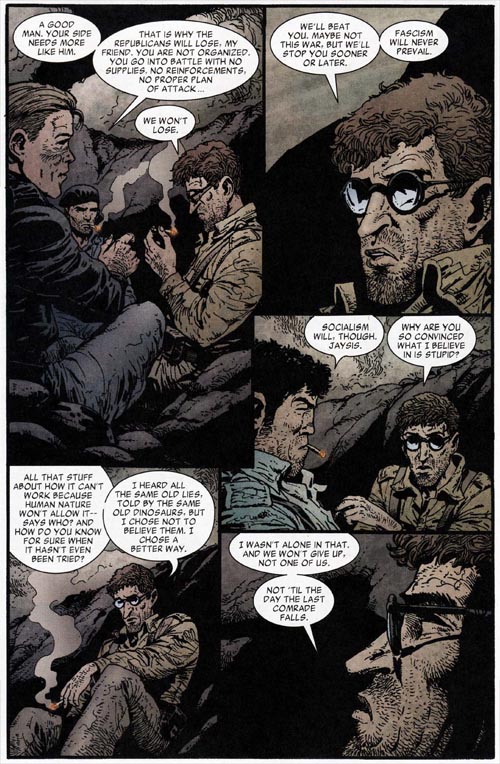
(from War Stories: Condors by Garth Ennis and Carlos Ezquerra)
30
Apr
Things I’d Like To Write Someday, #247654932
Posted by John Seavey Published in Comics, History, WriteringEver notice how sometimes, there’s a weird synchronicity at work in the things you read? I just got done reading a book about the Hollywood blacklist, and I’m now reading The Amazing Adventures of Kavalier and Clay (not bad, but I’d still rather read a biography than a roman à clef). Both of them focused a lot on the social unrest of the 1930s, as the world headed for war, and on a society that was far less united in its opposition to Hitler and fascism than we like to mythologize. (America has a disturbing tendency to mythologize its own past, and then unfavorably compare it to the realities of the present.)
Reading the two books together have sparked an idea in my head for a comic book. And since I’m probably never going to get a chance to write it, I’ll share the idea here.
It’s the biography of Steve Rogers.
When you think about it, we really don’t know much about Steve Rogers before he became Captain America. We know he walked into a recruiting office eager to do something–anything–to help fight the Nazis. We also know that his parents were dead by then (one of the reasons he was accepted as a volunteer was that he had no family.) But beyond that, it feels almost like he wasn’t a real person until the day they gave him the Super-Soldier Serum.
But I think he must have been a very interesting person indeed. Because Steve Rogers has always been socially progressive–his attitude towards Sam Wilson might seem patronizing to modern audiences, but for someone born in 1917, Steve Rogers is pretty damned enlightened. He seems to have been working-class; there’s no real mention of an inheritance anywhere in his background, and he’s had to take jobs to make ends meet on several occasions. And he’s very strongly anti-Fascist; it’s telling that he signed up to fight against Hitler a year before the United States’ entry into the war…and was passionate enough about it that he wouldn’t take 4F for an answer.
All those things add up to a very interesting, potentially shocking, probably fascinating backstory that’s never been touched on. Namely, that Steve Rogers probably grew up in a Communist household. He might not have been a card-carrying Communist himself, but his parents almost certainly were. Because being a Communist had a different meaning during the Great Depression than it did twenty years onwards, in a Cold War America. During the 1930s, when unemployment was high and a privileged few were almost completely insulated from the Depression’s effects, lots of people joined the Communists because they believed in things like unionization, racial equality, and fighting back against the rise of totalitarian dictatorships in Europe. (Lots of prominent leftists went to help in Spain against Franco before Hitler rose to power. It was the cause celebré of its day.) The later political connotations didn’t come about until after World War II…which is part of why so many people wound up getting nailed by accusations of associating with Communists when the witch-hunts started.
Both of Steve’s parents were Irish immigrants; I see Steve Rogers’ dad as a union organizer, perhaps a dockworker or a teamster. His mother might have been a seamstress, also a highly politically charged profession (when Steve Rogers would have been born, the tragedy of the Triangle Shirtwaist Factory fire was still a pretty recent memory.) The two of them probably believed solidly in the rights of the working man and woman, joined the Communist Party because many of their friends and fellow activists were members, and probably didn’t know nearly as much about Stalin as they thought they did. They might have led a fairly bohemian social life, rubbing shoulders with upper-class leftists like Hemingway or Dorothy Parker who liked to get involved with the lives of the people they were fighting for.
And by the time Steve was twenty, they were both dead. Certainly, that’s something that shouldn’t be treated lightly in any story about his life; union organizing in the ’20s and ’30s was a dangerous business. Activists could get beaten, jailed, or even discreetly murdered by hired thugs kept on the payroll. Maybe Steve’s dad died in a riot at the docks caused by paid agitators? Maybe his mother worked herself to exhaustion, eventually dying of pneumonia from trying to support the family single-handedly because Steve was too frail to get a job like his father had?
Steve’s poor physical health speaks volumes, too. It suggests malnutrition, childhood illnesses, the sort of thing that happened a lot in families too poor to afford good food and real doctors. Maybe Steve had a brother or a sister once, someone he never talks about because it’s too painful. Maybe he narrowly avoided the same fate.
The more I think about this, the more I think it would make a great story, a vibrant chronicle of pre-WWII America as seen through the eyes of a young man who would someday become its emblem. (Although he probably wouldn’t have stayed that way if he’d been around in the 50s. The HUAC would have had a field day with him. Maybe it was a good thing he stayed frozen in ice for a decade or so…) I’d love to write it. Tom Brevoort, if you’re reading this, call me!
29
Apr
– Is it just me, or is DC really trying to have its cake and eat it too as regards Supergirl/Brainiac 5? I mean, if you want the “return” of the “original Legion,” that means they’re all older than teenagers – like, thirtysomethings – which makes a Brainy romance with the still-a-teenager Supergirl problematic, to say the least. So their solution, rather than just scrap the idea, is to go with it and go with the “they met when Brainy was still Supergirl’s age and they fell in love THEN,” which, while certainly homaging the Silver Age and all, is homaging the wrong part of the Silver Age, IE, that which doesn’t work as a narrative when you think about it for more than two seconds. That entire last issue of Supergirl just felt creepy, with Brainy having a total Woody Allen vibe and Supergirl’s attraction to him being written more hamfistedly than when she was supposedly crushing on Hal “God’s Gift To Women! Right? Am I Right?” Jordan back in Brave and the Bold. (Also, I note that they have started teasing Supergirl’s death, so to everybody who said it wasn’t possible in the comments here, HA.)
– Why doesn’t Lee Weeks get more work? His recent arc in Amazing Spider-Man was better than any other artist on that title since the reboot (with the obvious exception of Marcos Martin). But I’m hardpressed to name the last thing he did prior to it unless you go back to the mid-90s.
– What’s the point of the current JLA storyline? I mean, this is a really stupid story idea: Nazis take over the world because they can neutralize the superheroes’ powers. What? I mean, come on. They’re Nazis. Never mind that most modern-day neo-Nazis are more or less inbred retards anyway and thus not the most threatening villains in the world; what’s the point of a future-story that you know, less than a page in, will never happen because the heroes go back in time or whatever to stop it from happening? This comic wants to be DC’s “Days of Future Past” so much it’s practically begging for it, except that it sucks.
– I thought this post from Jim Smith was brilliant. Choice quote: So you have a scene like the one in the Sinestro Corps storyline where Superboy-Prime returns to Earth, and I guess the JLA is out sick because an army of B-listers arrives as the first line of defense, and Wildcat is front and center. My admittedly hasty analysis is that Superboy-Prime’s powers are “rip people’s arms off and burn them to death” and his weaknesses are “kryptonite from Earth-Prime”; meanwhile Wildcat’s powers are “boxing” and his weaknesses are “pretty much anything,” so I’m pretty sure the only things he could do in this fight are “nothing” and “like it.” And indeed Wildcat did nothing for the whole story besides show up. So why did he show up? To remind me he’s a useless character wasting space.
– Quick The Losers movie review: good, solid, unpretentious action flick, but annoyingly sets up a franchise that will never actually happen. Chris Evans is lots of fun, but I still have trouble seeing him as Captain America. Idris Elba needs to be in more things, as does Jeffrey Dean Morgan. Zoe Saldana and the Aisha rework are… well, you get to see Zoe Saldana and she is pretty!
– Okay, I read a fair amount of comics, but how does Angel turn into Archangel? Like, I see that he can basically do that whenever he wants now. How does he do that? What comic did I miss that explains how “guy who can fly” now has the power of instantly turning into “razor-metal-death-wings-guy”? Because before this, it used to be that it took massive amounts of surgery to convert Angel to Archangel or vice versa. I mean, I get that Angel needs a gimmick to be more than Boring McWingybucks but yeesh.
28
Apr
Since people were wishing for the return of Improved Archie, here it is, in very very basic form:
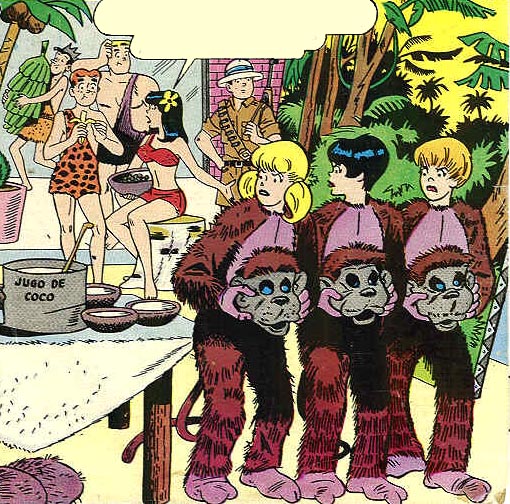
Have at it in comments.
Also, I’m looking for artists for a couple of projects – you know the email if you’re interested in working with me.
Search
"[O]ne of the funniest bloggers on the planet... I only wish he updated more."
-- Popcrunch.com
"By MightyGodKing, we mean sexiest blog in western civilization."
-- Jenn
Contact
MGKontributors
The Big Board
MGKlassics

Blogroll
- ‘Aqoul
- 4th Letter
- Andrew Wheeler
- Balloon Juice
- Basic Instructions
- Blog@Newsarama
- Cat and Girl
- Chris Butcher
- Colby File
- Comics Should Be Good!
- Creekside
- Dave’s Long Box
- Dead Things On Sticks
- Digby
- Enjoy Every Sandwich
- Ezra Klein
- Fafblog
- Galloping Beaver
- Garth Turner
- House To Astonish
- Howling Curmudgeons
- James Berardinelli
- John Seavey
- Journalista
- Kash Mansori
- Ken Levine
- Kevin Church
- Kevin Drum
- Kung Fu Monkey
- Lawyers, Guns and Money
- Leonard Pierce
- Letterboxd – Christopher Bird - Letterboxd – Christopher Bird
- Little Dee
- Mark Kleiman
- Marmaduke Explained
- My Blahg
- Nobody Scores!
- Norman Wilner
- Nunc Scio
- Obsidian Wings
- Occasional Superheroine
- Pajiba!
- Paul Wells
- Penny Arcade
- Perry Bible Fellowship
- Plastikgyrl
- POGGE
- Progressive Ruin
- sayitwithpie
- scans_daily
- Scary-Go-Round
- Scott Tribe
- Tangible.ca
- The Big Picture
- The Bloggess
- The Comics Reporter
- The Cunning Realist
- The ISB
- The Non-Adventures of Wonderella
- The Savage Critics
- The Superest
- The X-Axis
- Torontoist.com
- Very Good Taste
- We The Robots
- XKCD
- Yirmumah!
Donate
Archives
- August 2023
- May 2022
- January 2022
- May 2021
- January 2021
- December 2020
- October 2020
- June 2020
- March 2020
- January 2020
- December 2019
- October 2019
- February 2019
- January 2019
- December 2018
- April 2018
- March 2018
- February 2018
- January 2018
- December 2017
- November 2017
- October 2017
- February 2017
- January 2017
- December 2016
- November 2016
- October 2016
- September 2016
- August 2016
- July 2016
- June 2016
- May 2016
- April 2016
- March 2016
- February 2016
- January 2016
- December 2015
- November 2015
- October 2015
- September 2015
- August 2015
- July 2015
- June 2015
- May 2015
- April 2015
- March 2015
- February 2015
- January 2015
- December 2014
- November 2014
- October 2014
- September 2014
- August 2014
- July 2014
- June 2014
- May 2014
- April 2014
- March 2014
- February 2014
- January 2014
- December 2013
- November 2013
- October 2013
- September 2013
- August 2013
- July 2013
- June 2013
- May 2013
- April 2013
- March 2013
- February 2013
- January 2013
- December 2012
- November 2012
- October 2012
- September 2012
- August 2012
- July 2012
- June 2012
- May 2012
- April 2012
- March 2012
- February 2012
- January 2012
- December 2011
- November 2011
- October 2011
- September 2011
- August 2011
- July 2011
- June 2011
- May 2011
- April 2011
- March 2011
- February 2011
- January 2011
- December 2010
- November 2010
- October 2010
- September 2010
- August 2010
- July 2010
- June 2010
- May 2010
- April 2010
- March 2010
- February 2010
- January 2010
- December 2009
- November 2009
- October 2009
- September 2009
- August 2009
- July 2009
- June 2009
- May 2009
- April 2009
- March 2009
- February 2009
- January 2009
- December 2008
- November 2008
- October 2008
- September 2008
- August 2008
- July 2008
- June 2008
- May 2008
- April 2008
- March 2008
- February 2008
- January 2008
- December 2007
- November 2007
- October 2007
- September 2007
- August 2007
- July 2007
- February 2007
Tweet Machine
- No Tweets Available
Recent Posts
- Server maintenance for https
- CALL FOR VOTES: the 2021 rec.sport.pro-wrestling Awards
- CALL FOR NOMINATIONS: The 2021 rec.sport.pro-wrestling Awards (the Theszies)
- The 2020 RSPW Awards – RESULTS
- CALL FOR VOTES: the 2020 Theszies (rec.sport.pro-wrestling Awards)
- CALL FOR NOMINATIONS: The 2020 Theszies (rec.sport.pro-wrestling awards)
- given today’s news
- If you can Schumacher it there you can Schumacher it anywhere
- The 2019 RSPW Awards – RESULTS
- CALL FOR VOTES – The 2019 RSPW Awards (The Theszies)
Recent Comments
- Scott Hater in Bing, Bang, Bing, Fuck Off
- dan loz in Hey, remember how we talked a while a back about b…
- Sean in Server maintenance for https
- Ethan in CALL FOR VOTES: the 2021 rec.sport.pro-wrestling A…
- wyrmsine in ALIGNMENT CHART! Search Engines
- Jeff in CALL FOR VOTES: the 2021 rec.sport.pro-wrestling A…
- Greg in CALL FOR VOTES: the 2021 rec.sport.pro-wrestling A…
- DragoMaster009 in Grading Every Country's National Anthem, Part Four…
- DragoMaster009 in Review: The League of Regrettable Superheroes
- DragoMaster009 in MGK Ranks Every Live-Action Marvel Movie Since 199…
